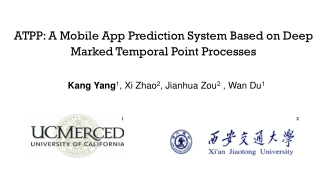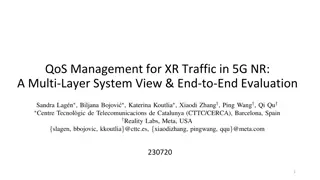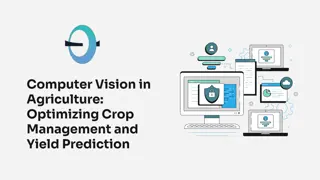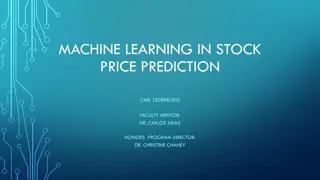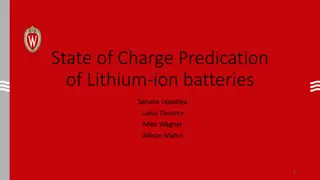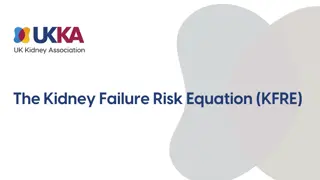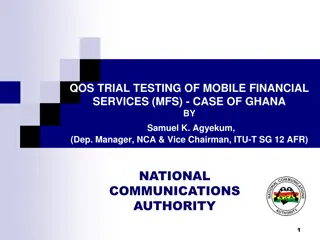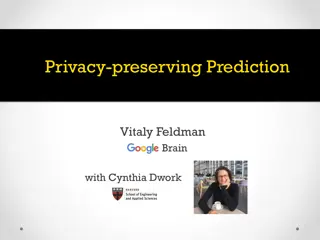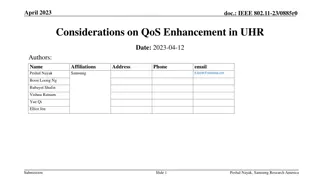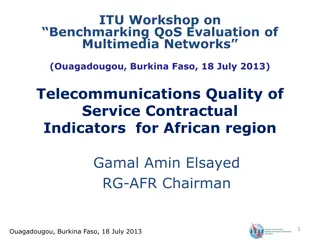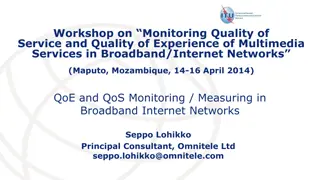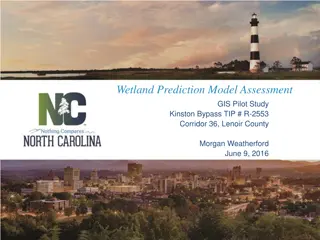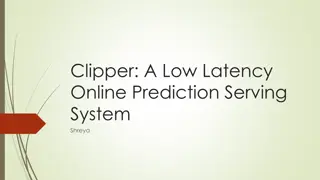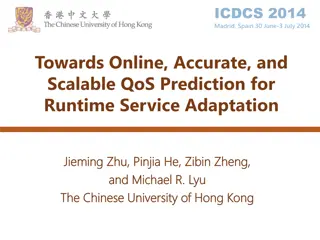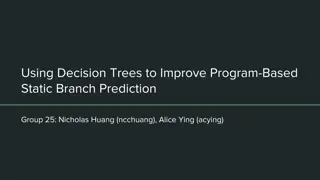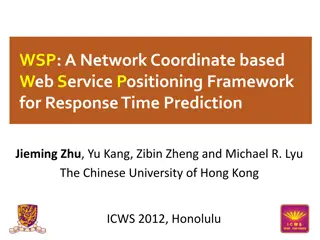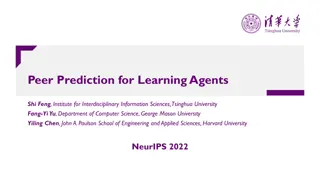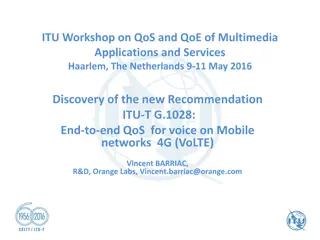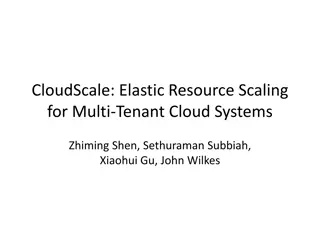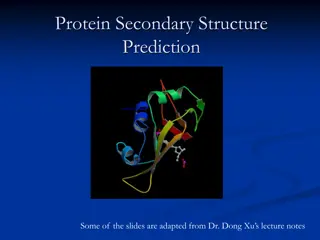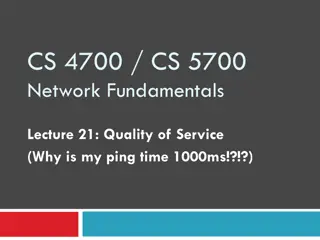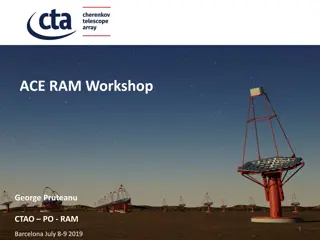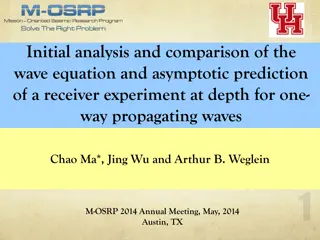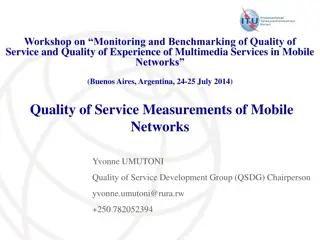Deep Reinforcement Learning for Mobile App Prediction
This research focuses on a system, known as ATPP, based on deep marked temporal point processes, designed for predicting mobile app usage patterns. By leveraging deep reinforcement learning frameworks and context-aware modules, the system aims to predict the next app a user will open, along with its
0 views • 24 slides
Address Prediction and Recovery in EECS 470 Lecture Winter 2024
Explore the concepts of address prediction, recovery, and interrupt recovery in EECS 470 lecture featuring slides developed by prominent professors. Topics include branch predictors, limitations of Tomasulo's Algorithm, various prediction schemes, branch history tables, and more. Dive into bimodal,
0 views • 42 slides
5G NR Traffic QoS Management: Multi-Layer System View & End-to-End Evaluation
5G NR technology emphasizes enhanced QoS for XR traffic, including AR, VR, and Cloud Gaming. This research delves into handling QoS for XR/CG traffic at various layers, proposing QoS control mechanisms at the application and MAC layers, along with an evaluation of these approaches using a simulator.
6 views • 14 slides
Enhancing QoS Facility for Low-Latency High-Throughput Performance in IEEE 802.11 Networks
This proposal addresses the shortcomings in traffic classification and handling of uplink/downlink traffic in current IEEE 802.11 specifications, particularly in relation to low-latency traffic. It also highlights issues with the current EDCA mode in managing congestion and proposes high-level solut
5 views • 18 slides
Understanding H.264/AVC: Key Concepts and Features
Exploring the fundamentals of MPEG-4 Part 10, also known as H.264/AVC, this overview delves into the codec flow, macroblocks, slices, profiles, reference picture management, inter prediction techniques, motion vector compensation, and intra prediction methods used in this advanced video compression
2 views • 32 slides
Computer Vision in Agriculture: Optimizing Crop Management and Yield Prediction
In recent years, the agriculture industry has witnessed a significant transformation fueled by technological advancements. Among these innovations, computer vision has emerged as a game-changer, offering unparalleled opportunities to optimize crop management and enhance yield prediction. Leveraging
7 views • 19 slides
Understanding Machine Learning for Stock Price Prediction
Explore the world of machine learning in stock price prediction, covering algorithms, neural networks, LSTM techniques, decision trees, ensemble learning, gradient boosting, and insightful results. Discover how machine learning minimizes cost functions and supports various learning paradigms for cla
2 views • 8 slides
Advancements in Air Pollution Prediction Models for Urban Centers
Efficient air pollution monitoring and prediction models are essential due to the increasing urbanization trend. This research aims to develop novel attention-based long-short term memory models for accurate air pollution prediction. By leveraging machine learning and deep learning approaches, the s
0 views • 17 slides
Understanding State of Charge Prediction in Lithium-ion Batteries
Explore the significance of State of Charge (SOC) prediction in lithium-ion batteries, focusing on battery degradation models, voltage characteristics, accurate SOC estimation, SOC prediction methodologies, and testing equipment like Digatron Lithium Cell Tester. The content delves into SOC manageme
0 views • 32 slides
KFRE: Validated Risk Prediction Tool for Kidney Replacement Therapy
KFRE, a validated risk prediction tool, aids in predicting the need for kidney replacement therapy in adults with chronic kidney disease. Developed in Canada in 2011, KFRE has undergone validation in over 30 countries, showing superior clinical accuracy in KRT prediction. Caution is advised when usi
0 views • 9 slides
Issues with SCS Operation in IEEE 802.11be Standard
The document discusses technical issues related to the SCS (Spatial Channel Sharing) operation in the IEEE 802.11be standard. It highlights inconsistencies in the standard regarding parameterized QoS requirements, mixing of traffic streams with different QoS needs, and challenges in prioritizing SCS
0 views • 15 slides
Time Synchronization in Cloud Gaming Services
Cloud gaming services like AIS, TSCAI, and TSC Assistance Container play a crucial role in providing quality of service (QoS) to millions of users globally. The need for time synchronization in 5G networks, especially for industrial applications like AR/VR, is highlighted. Trusted AF entities can di
0 views • 4 slides
Enhancing Network Performance with RoCE Technology
Remote Direct Memory Access (RDMA) benefits, RoCEv2 packet format, resilient RoCE feature progression, optimizing network performance with QoS, and RoCE congestion control convergence analysis are discussed in this proposal. RoCE technology offers low latency, high throughput, and efficient CPU usag
0 views • 19 slides
Real-time Experimental Lightning Flash Prediction Report
This Real-time Experimental Lightning Flash Prediction Report presents a detailed analysis of lightning flash forecasts based on initial conditions. Prepared by a team at the Indian Institute of Tropical Meteorology, Ministry of Earth Sciences, India, the report includes data on accumulated total li
0 views • 6 slides
Quality of Service (QoS) Trial Testing of Mobile Financial Services in Ghana
The National Communications Authority in Ghana conducted a QoS trial testing exercise on mobile financial services to assess compliance with QoS targets and consumer protection readiness. The test methodology involved using the SIGOS Integrated Test Environment system for billing verification on mob
5 views • 12 slides
Privacy-Preserving Prediction and Learning in Machine Learning Research
Explore the concepts of privacy-preserving prediction and learning in machine learning research, including differential privacy, trade-offs, prediction APIs, membership inference attacks, label aggregation, classification via aggregation, and prediction stability. The content delves into the challen
0 views • 11 slides
Enhancing Quality of Service in Ultra High Rate Wi-Fi Networks
This document explores the potential improvements in Quality of Service (QoS) for Ultra High Rate (UHR) Wi-Fi networks, focusing on the benefits of timing information sharing for traffic urgency assessment. It discusses areas such as increased reliability, lower latencies, improved manageability, an
0 views • 11 slides
Layered QoS and Multi-Layer Transmission in IEEE 802.11-22 for Enhanced WLAN Performance
The document discusses the importance of layered Quality of Service (QoS) and multi-layer transmission in meeting the high throughput and real-time requirements of metaverse applications over WLAN. It emphasizes the need for enhanced throughput, reliability, reduced latency, and improved power effic
0 views • 11 slides
IEEE Std. 802.11-22/1017r0 Overview and Architecture Presentation
This presentation by Dorothy Stanley from HP Enterprise delves into the utilization of IEEE Std. 802.11-2020 standards focusing on the IEEE Std. 802 overview and architecture. It covers topics such as the use of LLC, MAC address formats, QoS mechanisms, MSDU formats, and various MAC services and pro
0 views • 10 slides
Enhancing Contractual Parameters for Telecommunications Quality in Africa
Workshop in Ouagadougou focused on benchmarking QoS evaluation of multimedia networks, highlighting the importance of QoS, priority of contractual matters, inadequacy of E-803 for African region, and the role of regulators in customer rights. Suggestions included additional contractual parameters to
1 views • 18 slides
Enhancing Multimedia Services in Broadband Networks through QoE and QoS Monitoring
Explore the significance of Quality of Service (QoS) and Quality of Experience (QoE) monitoring in broadband internet networks, as discussed at a workshop in Maputo, Mozambique. Learn about Omnitele's approach to measuring end-user QoS and QoE, aiming to maximize customer experience and minimize net
0 views • 38 slides
Wetland Prediction Model Assessment in GIS Pilot Study for Kinston Bypass
Wetland Prediction Model Assessment was conducted in a GIS pilot study for the Kinston Bypass project in Lenoir County. The goal was to streamline project delivery through GIS resources. The study focused on Corridor 36, assessing various wetland types over a vast area using statistical and spatial
0 views • 16 slides
Clipper: A Low Latency Online Prediction Serving System
Machine learning often requires real-time, accurate, and robust predictions under heavy query loads. However, many existing frameworks are more focused on model training than deployment. Clipper is an online prediction system with a modular architecture that addresses concerns such as latency, throu
0 views • 17 slides
Scalable QoS Prediction for Service Adaptation in Service-Based Applications
This study delves into the challenge of predicting Quality of Service (QoS) for runtime service adaptation in service-based applications. It explores collaborative filtering and adaptive matrix factorization techniques for accurate QoS prediction, aiming towards enhancing service resilience and redu
0 views • 29 slides
Theoretical Justification of Popular Link Prediction Heuristics
This content discusses the theoretical justification of popular link prediction heuristics such as predicting connections between nodes based on common neighbors, shortest paths, and weights assigned to low-degree common neighbors. It also explores link prediction generative models and previous empi
0 views • 39 slides
Using Decision Trees for Program-Based Static Branch Prediction
This presentation discusses the use of decision trees to enhance program-based static branch prediction, focusing on improving the Ball and Larus heuristics. It covers the importance of static branch prediction, motivation behind the research, goals of the study, and background on Ball and Larus heu
0 views • 36 slides
Understanding Causality in News Event Prediction
Learning about the significance of predictions in news events and the process of causality mining for accurate forecasting. The research delves into problem definition, solution representation, algorithms, and evaluation in event prediction. Emphasis is placed on events, time representation, predict
0 views • 36 slides
Overview of Synthetic Models in Transcriptional Data Analysis
This content showcases various synthetic models for analyzing transcriptome data, including integrative models, trait prediction, and deep Boltzmann machines. It explores the generation of synthetic transcriptome data and the training processes involved in these models. The use of Restricted Boltzma
0 views • 14 slides
Network Coordinate-based Web Service Positioning Framework for Response Time Prediction
This paper presents the WSP framework, a network coordinate-based approach for predicting response times in web services. It explores the motivation behind web service composition, quality-of-service evaluation, and the challenges of QoS prediction. The WSP framework enables the selection of web ser
0 views • 30 slides
Understanding Peer Prediction Mechanisms in Learning Agents
Peer prediction mechanisms play a crucial role in soliciting high-quality information from human agents. This study explores the importance of peer prediction, the mechanisms involved in incentivizing truthful reporting, and the convergence of learning agents to truthful strategies. The Correlated A
0 views • 7 slides
Introduction to ITU-T G.1028: End-to-End QoS for VoLTE on 4G Networks
This overview covers the journey and development of ITU-T G.1028, focusing on end-to-end quality of service (QoS) for Voice over LTE (VoLTE) on 4G networks. It details the background, key milestones, essential elements of VoLTE services, optional mechanisms considered, QoS classifications, and call
0 views • 14 slides
CloudScale: Elastic Resource Scaling for Multi-Tenant Cloud Systems
CloudScale is an automatic resource scaling system designed to meet Service Level Objective (SLO) requirements with minimal resource and energy cost. The architecture involves resource demand prediction, host prediction, error correction, virtual machine scaling, and conflict handling. Module 1 focu
0 views • 37 slides
Amendments to WIPPS Manual for Climate Prediction at INFCOM-3, April 2024
The document discusses amendments to the Manual on WIPPS for climate prediction, including new recommendations for weather, climate, water, and environmental prediction activities. It introduces concepts such as Global Climate Reanalysis and the coordination of multi-model ensembles for sub-seasonal
0 views • 10 slides
Protein Secondary Structure Prediction: Insights and Methods
Accurate prediction of protein secondary structure is crucial for understanding tertiary structure, predicting protein function, and classification. This prediction involves identifying key elements like alpha helices, beta sheets, turns, and loops. Various methods such as manual assignment by cryst
0 views • 30 slides
Evolution of QoS/QoE in Broadcasting Services
Consumers and regulators are driving the need for established Quality of Service (QoS) and Quality of Experience (QoE) standards in broadcasting services. Stakeholders in Nairobi discussed the importance of ensuring signal quality, video/audio performance, and transmission metrics to meet subscriber
0 views • 12 slides
Understanding Quality of Experience (QoE) and Quality of Service (QoS) for IPTV Services
Explore the concepts of QoE and QoS for IPTV services, including user requirements, important definitions, QoE dimensions, compression artifacts, and components affecting channel zapping time. Learn about clean audio, VoD trick modes, triple play services, and more in this informative collection.
0 views • 13 slides
Understanding Quality of Service (QoS) in Network Fundamentals
Network Fundamentals Lecture 21 delves into Quality of Service (QoS) in networking, addressing the importance of prioritizing certain types of traffic based on factors like application performance, traffic importance, and service levels. The lecture explores the challenges of sharing resources among
0 views • 29 slides
ACE RAM Workshop - Barcelona 2019: Reliability and Maintenance Concepts
The ACE RAM Workshop conducted by George Pruteanu in Barcelona focused on topics such as RAM prediction, FMEA, maintenance concepts, preventive and predictive maintenance, condition monitoring systems, corrective maintenance, and design for maintenance. The workshop delved into reliability predictio
0 views • 16 slides
Analysis and Comparison of Wave Equation Prediction for Propagating Waves
Initial analysis and comparison of the wave equation and asymptotic prediction of a receiver experiment at depth for one-way propagating waves. The study examines the amplitude and information derived from a wave equation migration algorithm and its asymptotic form. The focus is on the prediction of
0 views • 23 slides
Workshop on Monitoring and Benchmarking of Quality of Service and Quality of Experience in Mobile Networks
Presentation focusing on quality of service monitoring and enforcement in mobile networks from a regulatory viewpoint. Covers purposes of QoS regulations, requirements for regulators, auditing methods, and QoS parameters for mobile services.
0 views • 14 slides
